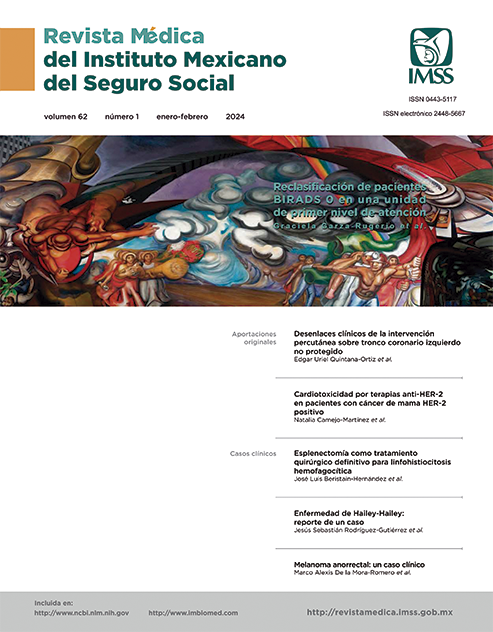Cardiotoxicity from anti-HER-2 therapies in patients with HER-2 positive breast cancer
Main Article Content
Keywords
c erbB 2 Protein, Breast Neoplasms, Cardiotoxicity, Uruguay
Abstract
Background: HER-2 positive (+) breast cancer (BC) accounts for 20-25% of BC, it is more aggressive, and it has a lower survival rate. Since the approval of trastuzumab in 1998, other HER-2-targeted therapies such as pertuzumab and trastuzumab emtansine (TDM1) have been introduced, improving patient survival. However, cardiotoxicity is an adverse effect of these treatments.
Objective: To estimate the incidence of cardiotoxicity with trastuzumab, trastuzumab/pertuzumab, and TDM1 in women with HER-2 + BC treated over a 6-year period at the Hospital de Clínicas and the Hospital Departamental de Soriano.
Material and methods: Observational, descriptive, and retrospective study which included patients with HER-2 + BC treated with trastuzumab, trastuzumab/pertuzumab, or TDM1.
Results: 81 patients were included, with a cardiotoxicity incidence of 23.4%. Cardiotoxicity was determined by a > 10% decrease in left ventricular ejection fraction (LVEF) (57.9%) and a LVEF < 50% evident during treatment (42.1%). Only 1 patient presented symptomatic heart failure. 63.1% of those who discontinued treatment due to cardiotoxicity managed to resume it. No relationship was evident between cardiovascular history or the administration regimen and the development of cardiotoxicity.
Conclusion: The study showed a cardiotoxicity incidence similar to the international one. Most did not present cardiac toxicity, and if they did, it was asymptomatic and reversible.
References
Sung H, Ferlay J, Siegel RL, et al. Global Cancer Statistics 2020: GLOBOCAN Estimates of Incidence and Mortality Worldwide for 36 Cancers in 185 Countries. CA Cancer J Clin. 2021;71(3):209-49. doi: 10.3322/caac.21660.
Comisión Honoraria de Lucha contra el Cáncer. Situación epidemiológica del Uruguay en relación al cáncer. Incidencia del cáncer en el quinquenio 2014-2018. Tendencia de la mortalidad por cáncer hasta 2020. Uruguay: Comisión Honoraria de Lucha Contra el Cáncer; mayo de 2021 [consultado el 6 de agosto de 2023]. Disponible en: https://www.comisioncancer.org.uy/aucdocumento.aspx?311,1465.
Harbeck N, Penault-Llorca F, Cortes J, et al. Breast cancer. Nat Rev Dis Primers. 2019;5(1):66. doi: 10.1038/s41572-019-0111-2.
Hudis CA. Trastuzumab —Mechanism of action and use in clinical practice. N Engl J Med. 2007;357(1):39-51. doi: 10.1056/NEJMra043186.
Martínez-Sáez O, Prat A. Current and Future Management of HER2-Positive Metastatic Breast Cancer. JCO Oncol Pract. 2021;17(10):594-604. doi: 10.1200/OP.21.00172.
Dormann C. Metastatic Human Epidermal Growth Factor Receptor 2-Positive Breast Cancer: Current Treatment Standards and Future Perspectives. Breast Care (Basel). 2020;15(6):570-8. doi: 10.1159/000512328.
Dempsey N, Rosenthal A, Dabas N, et al. Trastuzumab-induced cardiotoxicity: a review of clinical risk factors, pharmacologic prevention, and cardiotoxicity of other HER2-directed therapies. Breast Cancer Res Treat. 2021;188(1):21-36. doi: 10.1007/s10549-021-06280-x.
Chianca M, L'Abbate S, Fabiani I, et al. Clinical management of drug-induced cardiotoxicity in patients with HER-2+ breast cancer: current recommendations and future outlook. Expert Opin Drug Metab Toxicol. 2023;19(2):109-119. doi: 10.1080/17425255.2023.2197589.
Curigliano G, Lenihan D, Fradley M, et al. Management of cardiac disease in cancer patients throughout oncological treatment: ESMO consensus recommendations. Ann Oncol. 2020;31(2):171-190. doi: 10.1016/j.annonc.2019.10.023.
Swain SM, Miles D, Kim SB, et al. Pertuzumab, trastuzumab, and docetaxel for HER2-positive metastatic breast cancer (CLEOPATRA): end-of-study results from a double-blind, randomised, placebo-controlled, phase 3 study. Lancet Oncol. 2020;21(4):519-30. doi: 10.1016/S1470-2045(19)30863-0.
Diéras V, Miles D, Verma S, et al. Trastuzumab emtansine versus capecitabine plus lapatinib in patients with previously treated HER2-positive advanced breast cancer (EMILIA): a descriptive analysis of final overall survival results from a randomised, open-label, phase 3 trial. Lancet Oncol. 2017;18(6):732-42. doi: 10.1016/S1470-2045(17)30312-1.
Mishkin GE, Denicoff AM, Best AF, et al. Update on Enrollment of Older Adults Onto National Cancer Institute National Clinical Trials Network Trials. J Natl Cancer Inst Monogr. 2022(60):111-6. doi: 10.1093/jncimonographs/lgac017.
Rawlins M. De testimonio: on the evidence for decisions about the use of therapeutic interventions. Lancet. 2008;372(9656):2152-61. doi: 10.1016/S0140-6736(08)61930-3.
Golder S, Loke YK, Bland M. Meta-analyses of adverse effects data derived from randomised controlled trials as compared to observational studies: methodological overview. PLoS Med. 2011;8(5):e1001026. doi: 10.1371/journal.pmed.1001026.
De Santis CE, Ma J, Gaudet MM, et al. Breast cancer statistics, 2019. CA Cancer J Clin. 2019;69(6):438-51. doi: 10.3322/caac.21583.
Valle-Solís AE, Miranda-Aguirre AP, Mora-Pérez J, et al. Supervivencia en cáncer de mama por subtipo mediante inmunohistoquímica: Un estudio retrospectivo. Gac Med Mex. 2019;155(Suppl 1):S50-S55. doi: 10.24875/GMM.19005133.
Barrios E, Garau M. Cáncer: magnitud del problema en el mundo y en Uruguay, aspectos epidemiológicos. Anfamed. 2017;4:04-66. doi: 10.25184/anfamed2017.4.1.2.
National Cancer Institute. Cancer Stat Facts: Female Breast Cancer. USA: NCI; [sin fecha de actualización] [consultado el 31 de agosto de 2023]. Disponible en: https://seer.cancer.gov/statfacts/
Castillo C, Camejo N, Etcheverria C, et al. Trastuzumab-induced cardiotoxicity in early breast cancer over a 10-year period in Uruguay. Medicine (Baltimore). 2022;101(30):e29927. doi: 10.1097/MD.0000000000029927.
Cameron D, Piccart-Gebhart MJ, Gelber RD, et al. 11 years' follow-up of trastuzumab after adjuvant chemotherapy in HER2-positive early breast cancer: final analysis of the HERceptin Adjuvant (HERA) trial. Lancet. 2017;389(10075):1195-205. doi: 10.1016/S0140-6736(16)32616-2.
Perez EA, Romond EH, Suman VJ, et al. Four-year follow-up of trastuzumab plus adjuvant chemotherapy for operable human epidermal growth factor receptor 2-positive breast cancer: joint analysis of data from NCCTG N9831 and NSABP B-31. J Clin Oncol. 2011;29(25):3366-73. doi: 10.1200/JCO.2011.35.0868.
Tocchetti CG, Ragone G, Coppola C, et al. Detection, monitoring, and management of trastuzumab-induced left ventricular dysfunction: an actual challenge. Eur J Heart Fail. 2012;14(2):130-7. doi: 10.1093/eurjhf/hfr165.


